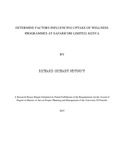| dc.description.abstract | This study seeks to determine factors influencing uptake of the employee wellness program
initiatives offered by Safaricom Limited. Objectives for the study are to establish the influence of
socio – demographics, time limitation, cost of the wellness products, programme design and
employee attitude towards health on uptake of wellness programmes. Descriptive survey design
was adopted. Staff were clustered depending on their work location; 10% of the total population
was sampled randomly, semi-structured questionnaire was deployed and data gathered was cross
tabulated to determine the effect of socio-demographic, cost, time limitation, employee health
attitude and program structure on workplace wellness programmes uptake in Safaricom Limited.
The results have shown that the body mass index distribution of the employees in Safaricom Ltd
is skewed towards overweight and obesity, when compared to the national distribution. The
overweight employees at Safaricom Ltd contributed to 39.6 % of the population and obese 5.1%.
This is a high percentage when compared to the national distribution which is 19.2 % and 6.9%.
Employees are conscious of the fact that physical exercises are important for them, however uptake
of wellness initiatives is low. This study concludes that cost, time, health status and attitudes of
employees and the wellness program structure affect the uptake of wellness programs at Safaricom
Ltd but in different degrees. The employee health status and attitude (3.65) has the highest
influence on the uptake of the wellness programs. Time considerations have the second highest
(3.4) effect on the uptake of wellness programs at Safaricom Ltd. This is followed by the structure
of the program (3.3). Cost of the programs (2.6) has the lowest effect on the uptake of the wellness
programs at Safaricom Ltd. Participatory approach in wellness initiative structures, subsiding of
monthly gym and crèche subscription/charges and continuous wellness/health education to
improve on employee attitude towards health - tailored to need-specific for each station and in
sync with staff off-work hours was recommended. More factors can also affect the uptake of
wellness programs at workplaces. These include education level of the employees, their wealth
status, their positions at work and the organizational culture. Future studies should focus on these
factors and find out how they relate to the uptake of the wellness programs at places of work. | en_US |

